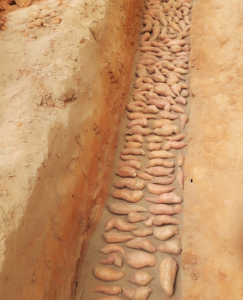 In July 2018 Issahaq Suleman, CIP’s Triple S scaling champion in Ghana, paid a visit to Damongo Agricultural College in the West Gonja district of Northern Ghana, with the goal of advocating for practical training on farming improved varieties of orange-fleshed sweetpotato (OFSP). He also wanted to introduce the college to the use of Triple S technology, to conserve roots and generate quality planting material after a long dry season such as that experienced in Northern Ghana. Damongo Agricultural College is one of the five colleges in the country that train agricultural extension agents. It offers both certificate and diploma courses and currently has 224 students who undergo training over a maximum period of two years. One of the goals of the Triple S scaling project in Ghana, funded by the RTB Scaling Fund, is to increase the number of farmers aware of the technology through influencing the inclusion of the technology in the curriculum of institutions that train agricultural extension agents (AEA). AEAs are government agents who work with farmers to continuously train farmers on good agricultural practice and new technologies.
In July 2018 Issahaq Suleman, CIP’s Triple S scaling champion in Ghana, paid a visit to Damongo Agricultural College in the West Gonja district of Northern Ghana, with the goal of advocating for practical training on farming improved varieties of orange-fleshed sweetpotato (OFSP). He also wanted to introduce the college to the use of Triple S technology, to conserve roots and generate quality planting material after a long dry season such as that experienced in Northern Ghana. Damongo Agricultural College is one of the five colleges in the country that train agricultural extension agents. It offers both certificate and diploma courses and currently has 224 students who undergo training over a maximum period of two years. One of the goals of the Triple S scaling project in Ghana, funded by the RTB Scaling Fund, is to increase the number of farmers aware of the technology through influencing the inclusion of the technology in the curriculum of institutions that train agricultural extension agents (AEA). AEAs are government agents who work with farmers to continuously train farmers on good agricultural practice and new technologies.
During Suleman’s visit, he met with the acting principal of the college at the time, Mohamed Adam, and explained the advantages of OFSP for food and nutrition security, the availability of improved varieties released by the national research institution, CSIR – CRI (Council for Scientific and Industrial Research – Crops Research Institute) as well as improved farming technologies aimed at improving yield. Triple S is one such technology as it allows farmers to have quality planting material in sufficient quantities, in time for the planting season. Traditionally, roots are conserved by burying them in the field which exposes them to weevils, which in turn affects the quality of the planting material generated.
Damongo Agricultural College was receptive to the technology and with a go-ahead from the Ministry of Food and Agriculture (MoFA), underwent an initial training. There were 126 students and eight tutors involved in the trainings that were delivered through printed material, instructional videos and hands-on demonstration of the innovation. After the training, the students cultivated an acre of OFSP on the College premises in August 2018.
Read the full story on the RTB blog
